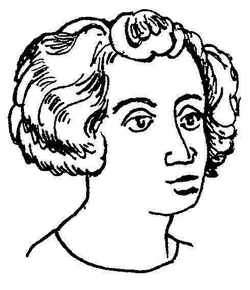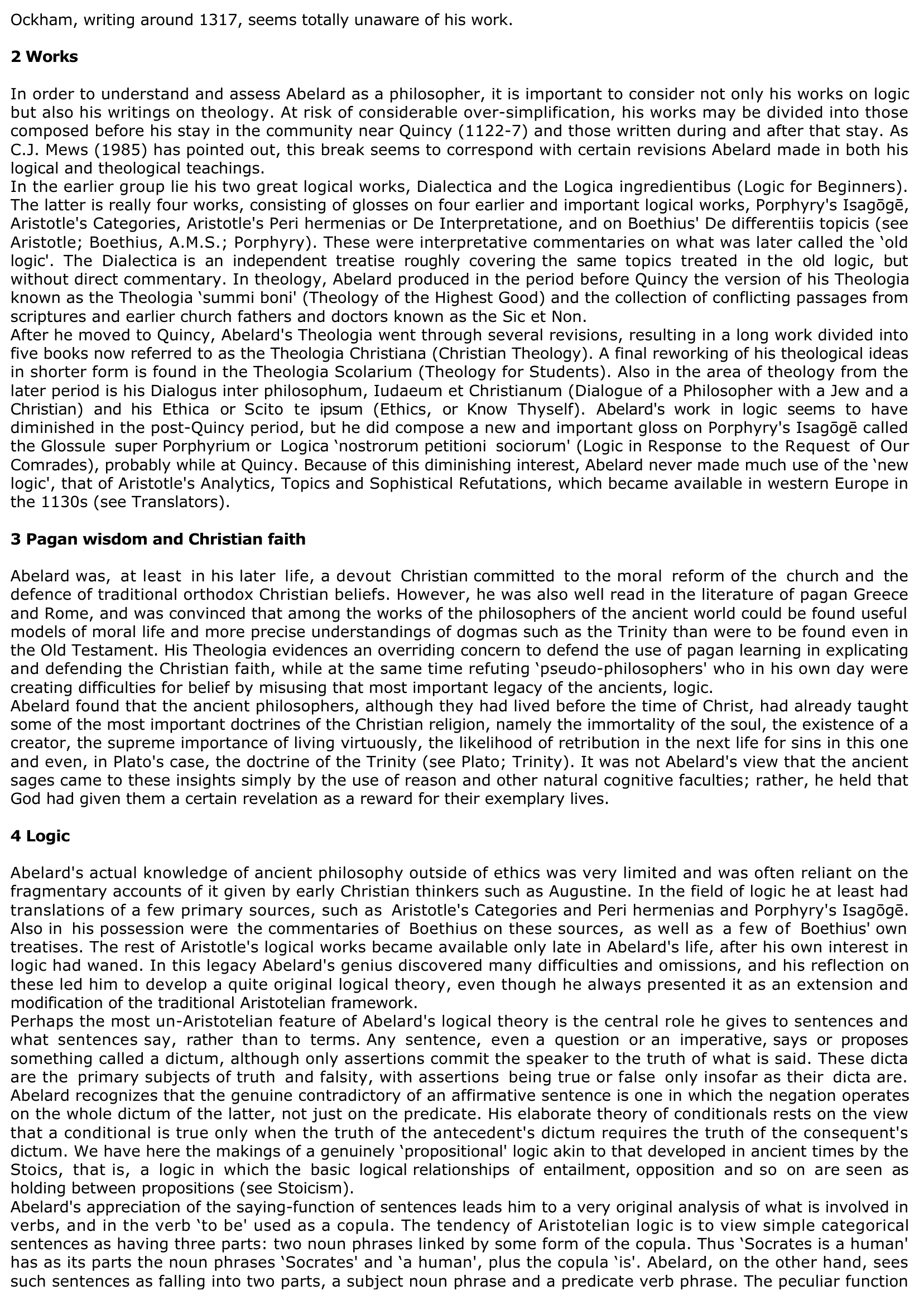Encyclopedia of Philosophy: Abelard, Peter
Publié le 09/01/2010

Extrait du document

In comparison with most other medieval thinkers we know a great deal about Abelard’s career, since he left an autobiographical essay entitled Historia Calamitatum (The Story of My Misfortunes), which in effect recounts his life up to about 1132. He was born to a noble and very religious family in Le Pallet, near Nantes in Brittany, in 1079. Roscelin of Compiègne was one of his earliest teachers, and later in Paris he studied under William of Champeaux. In these years Abelard’s main interest was logic, or dialectic as it was then called, which also included metaphysical issues such as the status of universals as well as psychological topics such as the role of images in thought. It was over the subject of universals that Abelard came into acrimonious conflict with William of Champeaux, and eventually he left Paris to set up his own schools nearby, first in Corbeil and later in Melun. Having achieved a reputation as a subtle logician, Abelard moved on to study theology with Anselm of Laon, but here again he fell into competition with his teacher and even lured away some of his students. The stay at Laon was short, and by 1114 Abelard was back teaching logic in Paris. However, theology was to move more and more to the centre of his interests as his career progressed.

«
Ockham, writing around 1317, seems totally unaware of his work.
2 Works
In order to understand and assess Abelard as a philosopher, it is important to consider not only his works on logicbut also his writings on theology.
At risk of considerable over-simplification, his works may be divided into thosecomposed before his stay in the community near Quincy (1122-7) and those written during and after that stay.
AsC.J.
Mews (1985) has pointed out, this break seems to correspond with certain revisions Abelard made in both hislogical and theological teachings.In the earlier group lie his two great logical works, Dialectica and the Logica ingredientibus (Logic for Beginners).The latter is really four works, consisting of glosses on four earlier and important logical works, Porphyry's Isagōgē,Aristotle's Categories, Aristotle's Peri hermenias or De Interpretatione, and on Boethius' De differentiis topicis (seeAristotle; Boethius, A.M.S.; Porphyry).
These were interpretative commentaries on what was later called the ‘oldlogic'.
The Dialectica is an independent treatise roughly covering the same topics treated in the old logic, butwithout direct commentary.
In theology, Abelard produced in the period before Quincy the version of his Theologiaknown as the Theologia ‘summi boni' (Theology of the Highest Good) and the collection of conflicting passages fromscriptures and earlier church fathers and doctors known as the Sic et Non.After he moved to Quincy, Abelard's Theologia went through several revisions, resulting in a long work divided intofive books now referred to as the Theologia Christiana (Christian Theology).
A final reworking of his theological ideasin shorter form is found in the Theologia Scolarium (Theology for Students).
Also in the area of theology from thelater period is his Dialogus inter philosophum, Iudaeum et Christianum (Dialogue of a Philosopher with a Jew and aChristian) and his Ethica or Scito te ipsum (Ethics, or Know Thyself).
Abelard's work in logic seems to havediminished in the post-Quincy period, but he did compose a new and important gloss on Porphyry's Isag ōgē calledthe Glossule super Porphyrium or Logica ‘nostrorum petitioni sociorum' (Logic in Response to the Request of OurComrades), probably while at Quincy.
Because of this diminishing interest, Abelard never made much use of the ‘newlogic', that of Aristotle's Analytics, Topics and Sophistical Refutations, which became available in western Europe inthe 1130s (see Translators).
3 Pagan wisdom and Christian faith
Abelard was, at least in his later life, a devout Christian committed to the moral reform of the church and thedefence of traditional orthodox Christian beliefs.
However, he was also well read in the literature of pagan Greeceand Rome, and was convinced that among the works of the philosophers of the ancient world could be found usefulmodels of moral life and more precise understandings of dogmas such as the Trinity than were to be found even inthe Old Testament.
His Theologia evidences an overriding concern to defend the use of pagan learning in explicatingand defending the Christian faith, while at the same time refuting ‘pseudo-philosophers' who in his own day werecreating difficulties for belief by misusing that most important legacy of the ancients, logic.Abelard found that the ancient philosophers, although they had lived before the time of Christ, had already taughtsome of the most important doctrines of the Christian religion, namely the immortality of the soul, the existence of acreator, the supreme importance of living virtuously, the likelihood of retribution in the next life for sins in this oneand even, in Plato's case, the doctrine of the Trinity (see Plato; Trinity).
It was not Abelard's view that the ancientsages came to these insights simply by the use of reason and other natural cognitive faculties; rather, he held thatGod had given them a certain revelation as a reward for their exemplary lives.
4 Logic
Abelard's actual knowledge of ancient philosophy outside of ethics was very limited and was often reliant on thefragmentary accounts of it given by early Christian thinkers such as Augustine.
In the field of logic he at least hadtranslations of a few primary sources, such as Aristotle's Categories and Peri hermenias and Porphyry's Isag ōgē.Also in his possession were the commentaries of Boethius on these sources, as well as a few of Boethius' owntreatises.
The rest of Aristotle's logical works became available only late in Abelard's life, after his own interest inlogic had waned.
In this legacy Abelard's genius discovered many difficulties and omissions, and his reflection onthese led him to develop a quite original logical theory, even though he always presented it as an extension andmodification of the traditional Aristotelian framework.Perhaps the most un-Aristotelian feature of Abelard's logical theory is the central role he gives to sentences andwhat sentences say, rather than to terms.
Any sentence, even a question or an imperative, says or proposessomething called a dictum, although only assertions commit the speaker to the truth of what is said.
These dictaare the primary subjects of truth and falsity, with assertions being true or false only insofar as their dicta are.Abelard recognizes that the genuine contradictory of an affirmative sentence is one in which the negation operateson the whole dictum of the latter, not just on the predicate.
His elaborate theory of conditionals rests on the viewthat a conditional is true only when the truth of the antecedent's dictum requires the truth of the consequent'sdictum.
We have here the makings of a genuinely ‘propositional' logic akin to that developed in ancient times by theStoics, that is, a logic in which the basic logical relationships of entailment, opposition and so on are seen asholding between propositions (see Stoicism).Abelard's appreciation of the saying-function of sentences leads him to a very original analysis of what is involved inverbs, and in the verb ‘to be' used as a copula.
The tendency of Aristotelian logic is to view simple categoricalsentences as having three parts: two noun phrases linked by some form of the copula.
Thus ‘Socrates is a human'has as its parts the noun phrases ‘Socrates' and ‘a human', plus the copula ‘is'.
Abelard, on the other hand, seessuch sentences as falling into two parts, a subject noun phrase and a predicate verb phrase.
The peculiar function.
»
↓↓↓ APERÇU DU DOCUMENT ↓↓↓
Liens utiles
- Encyclopedia of Philosophy: ABELARD'S ETHICS
- Encyclopedia of Philosophy: ABELARD'S LOGIC
- Encyclopedia of Philosophy: ABELARD AND HÉLoÏsE
- Encyclopedia of Philosophy: al-Ghazali, Abu Hamid
- Encyclopedia of Philosophy: al-Farabi, Abu Nasr

































